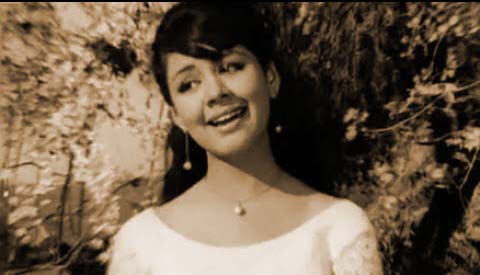Farida Jalal:
crème de la crème
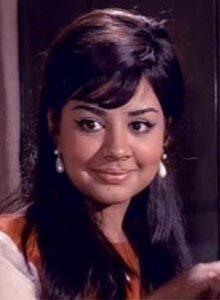 The sixties saw the emergence of a new generation of stars: stars who symbolised attitude and aggressiveness, style and showmanship; stars who dissipated inhibitions and displayed vim and vigour; stars who lured and allured, serenaded and swayed.
The sixties saw the emergence of a new generation of stars: stars who symbolised attitude and aggressiveness, style and showmanship; stars who dissipated inhibitions and displayed vim and vigour; stars who lured and allured, serenaded and swayed. Legendary actress Farida Jalal, who made her foray into films in the same decade, would have all these; but, not extreme, not intense and certainly not packed with that little extra oomph and emotional heat which would have qualified her as an A list glamour girl. Unforgivably, she was relegated to playing the secondary or sisterly roles.
THE FARID~a f~ACTOR
Yet, the ‘Thodi chhoti hai, thodi moti hai’ starlet stood tall with her:
pleasantly plump and sweetly short stature,
unyielding mien and manner and amiable, friendly and warm nature;
endearing and engaging lineaments, ever agile and forever mobile,
expressive large almond shaped eyes and an effervescent smile;
a cuttlefish like fluid face and a camera friendly candid presence,
a charismatic persona, frothy and full of life and impassioned and intense;
a cornucopia of roles and a plethora of emotions,
and a crisp clear diction, infusing and suffusing the right expressions.
These finer factors of Farida Jalal make her a ‘farid’ (unique) actor!!
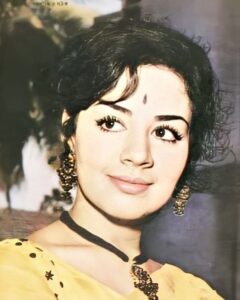 In other words, she came, she saw, she conquered and she created a distinct and unique niche for herself as an ever dependable, quintessential actor with her decent and dignified girl next door image, doll like personal charm and charisma, grace and gaiety, poise and punch. Blessed by the Almighty Allah and beckoned by our prayers, she captured and enraptured the audience for over fifty five years.
In other words, she came, she saw, she conquered and she created a distinct and unique niche for herself as an ever dependable, quintessential actor with her decent and dignified girl next door image, doll like personal charm and charisma, grace and gaiety, poise and punch. Blessed by the Almighty Allah and beckoned by our prayers, she captured and enraptured the audience for over fifty five years. While most of the heroines of her times dazzled for a while and receded gradually into the dark alleys of oblivion, Farida Jalal, in her sportingly supporting mantle, continued to shimmer on the filmy firmament for long and straddled the scene with consummate ease even in the 90s and post 2000 period.
The art and craft of filmmaking had changed drastically but Farida Jalal externalised the change, adapted to the changing times and trends gracefully and found greater glory. Like the fine wine, the GOOD actress only got BETTER with age and her BEST is yet to come. Three cheers to the ageless actress who turns 73 on 18 May, 2022.
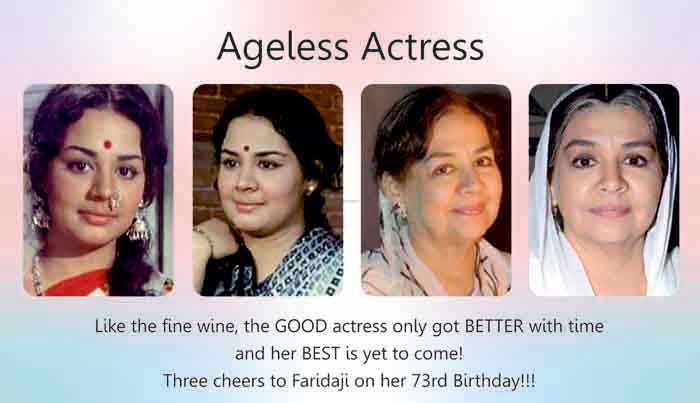
ACADEMICS TO ARC LIGHTS
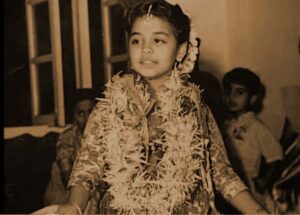 Farida Sami aka Farida Jalal was born on 18 May, 1949 in Mumbai. Her parents separated when she was two years. She and her older brother Khalid Sami were brought up by their mother and their emotionally strong and practical minded maternal grandmother who filled the void of a father.
Farida Sami aka Farida Jalal was born on 18 May, 1949 in Mumbai. Her parents separated when she was two years. She and her older brother Khalid Sami were brought up by their mother and their emotionally strong and practical minded maternal grandmother who filled the void of a father. 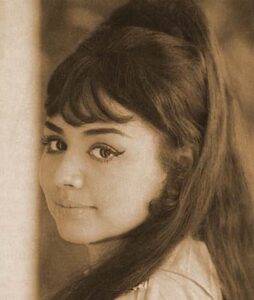 Farida Jalal (the honorific ‘Jalal’ meaning ‘dignity’ was conferred by her grandmother) did her schooling in the St. Joseph’s Convent in Panchgani. From childhood, she was fond of dancing and it was mandatory to have her dance performance in every cultural event of her alma mater. One such performance that she remembers fondly is her enactment of the iconic song ‘Mera naam Raju, gharana anaam‘ from Raj Kapoor’s super hit film ‘Jis Desh Mein Ganga Behti Hai’.
Farida Jalal (the honorific ‘Jalal’ meaning ‘dignity’ was conferred by her grandmother) did her schooling in the St. Joseph’s Convent in Panchgani. From childhood, she was fond of dancing and it was mandatory to have her dance performance in every cultural event of her alma mater. One such performance that she remembers fondly is her enactment of the iconic song ‘Mera naam Raju, gharana anaam‘ from Raj Kapoor’s super hit film ‘Jis Desh Mein Ganga Behti Hai’. She had always wanted to become an actress. But, she did not become one by serendipity; she was born to act! With inborn talent and joie de vivre and without any formal training of acting or initial struggle, she walked into films and, with her very first film, she walked into the hearts of the movie goers.
FOSTERED BY ‘FATE’ TO FAME AND FORTUNE
While still in school and in her mid teens, she participated in the Filmfare~United Producers Combine Talent Hunt competition organised in 1965. Along with another participant named Jatin Khanna, she too was adjudged winner of the competition. Both the winners were felicitated at the annual awards function of Filmfare in 1966. Tarachand Barjatya, the doyen of the iconic Rajshri Productions, was one of the esteemed guests at the function and, impressed with the starlet, he signed her for the banner’s third film ‘Taqdeer’ (1967). The rest is history or her story. Incidentally, her co winner Jatin Khanna went on to become the superstar Rajesh Khanna.
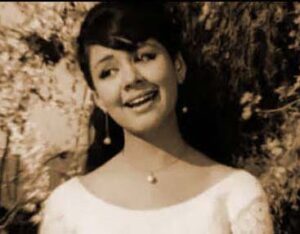 ‘Taqdeer’ was a low budget, black and white film which came in the wake of two successful films of the Rajshris viz. ‘Aarti’ (1962) and ‘Dosti’ (1964). It was a remake of the hit Goan Konkani film ‘Nirmon’ (1966) which was produced by music director Frank Fernand and directed by A Salaam who also directed the Hindi version. ‘Taqdeer’ starred the veteran actor Bharat Bhushan, (in his last major role as a hero) opposite the famous Konkini actress Shalini Mardolkar (who acted in the Konkani version too).
‘Taqdeer’ was a low budget, black and white film which came in the wake of two successful films of the Rajshris viz. ‘Aarti’ (1962) and ‘Dosti’ (1964). It was a remake of the hit Goan Konkani film ‘Nirmon’ (1966) which was produced by music director Frank Fernand and directed by A Salaam who also directed the Hindi version. ‘Taqdeer’ starred the veteran actor Bharat Bhushan, (in his last major role as a hero) opposite the famous Konkini actress Shalini Mardolkar (who acted in the Konkani version too). Farida Jalal played the youngest of the three children of the lead pair and, coincidentally, her first co star was yet another Jalal i.e. Jalal Agha (son of veteran comedian Agha). As a caring and compassionate daughter, Farida Jalal made people take note of her endearing and heart warming performance.
It was indeed a very remarkable debut with a bonus of two songs filmed on her: the evergreen ‘Jab jab bahar aayi‘ (two versions were on her) which reverberates in the film from time to time and ‘Aaiye bahar ko hum baantle‘.
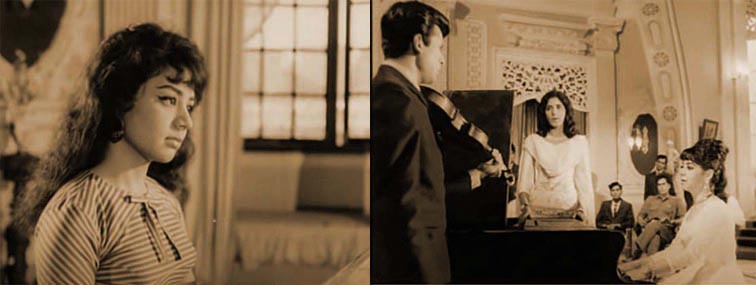
The ‘bahar’ (spring symbolising a new beginning) that her divinely inspired ‘taqdeer’ brought along pervades even today in the garden of her life and, like the bounteous nature that resumes her loveliness with every spring, Farida Jalal too has been adding new life and new beauty to her artistic soul with every new film and performance.
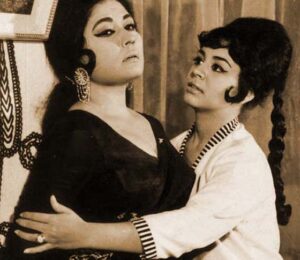 Close on heels of her successful debut in ‘Taqdeer’ came ‘Baharon Ki Manzil’ (1968) starring Meena Kumari and Dharmendra (their seventh and last film together). Farida Jalal played the daughter of an ‘amnesia stricken’ Meena Kumari and Rehman and in the two scenes she shared with the veterans, she held her own with an extremely endearing performance; in the poignant scene with Meena Kumari, the innocence with which she pleads for recognition (of the mother~daughter relationship) with a ‘meend’ (glide) on the word ‘Mummy’ grabs the eye balls and tugs at the heart of the cinegoers.
Close on heels of her successful debut in ‘Taqdeer’ came ‘Baharon Ki Manzil’ (1968) starring Meena Kumari and Dharmendra (their seventh and last film together). Farida Jalal played the daughter of an ‘amnesia stricken’ Meena Kumari and Rehman and in the two scenes she shared with the veterans, she held her own with an extremely endearing performance; in the poignant scene with Meena Kumari, the innocence with which she pleads for recognition (of the mother~daughter relationship) with a ‘meend’ (glide) on the word ‘Mummy’ grabs the eye balls and tugs at the heart of the cinegoers. The haunting and the most popular song of the film: ‘Nigahen kyon bhatakti‘ hai is supposed to be lip synced by her as would be seen from the fleeting shot at the end of the song which shows her playing the piano and calling out ‘chale aao’.
THE FLOWERING OF FARIDA
Farida Jalal arrived in a big way in 1969 with the evergreen romantic musical ‘Aradhana’ though the major focus was on the fresh lead pair Rajesh Khanna and Sharmila Tagore. The same year she had one more release, the eminently forgettable murder mystery musical ‘Mahal’ with bigger stars Dev Anand and Asha Parekh. Both the films warrant special mention for two different reasons.
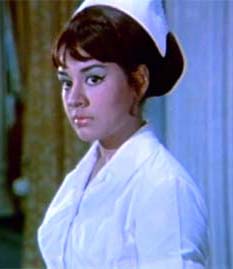 In ‘Mahal’, Farida Jalal played a charming but creepy nurse creating a feeling of fear and unease. She also got to sing a seductive song, the come hither ‘Aaiye aap ka tha hamen intzaar‘ to honey trap the hero. This was probably the first and last time she played a seductress that was in total contrast to her image. Luckily for her, ‘Mahal’ came crumbling down at the box office and she was never repeated in such a role in any of her films. Coz, the conservative audience always loved to see the hero~heroine and villain~vamp in clear black and white terms.
In ‘Mahal’, Farida Jalal played a charming but creepy nurse creating a feeling of fear and unease. She also got to sing a seductive song, the come hither ‘Aaiye aap ka tha hamen intzaar‘ to honey trap the hero. This was probably the first and last time she played a seductress that was in total contrast to her image. Luckily for her, ‘Mahal’ came crumbling down at the box office and she was never repeated in such a role in any of her films. Coz, the conservative audience always loved to see the hero~heroine and villain~vamp in clear black and white terms. Arrival Anew with Aradhana
‘Aradhana’ was based loosely on the Hollywood film ‘To Each His Own’ and publicised as ‘A tale of Sublime Love and Worship’. The film was released (on 04 October, 1969 at Roxy, Bombay) within three months after ‘Mahal’ and went on to become the biggest hit of the year. The mind wipe film erased the not so pleasant memories of ‘Mahal’.
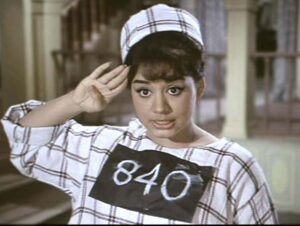 In the film, she ‘arrives’ almost towards the end of the film with an apt introduction as ‘pyaari’ and ‘bholi’, epithets befitting her persona and personality. She played the bubbly and lively daughter of a jailor (played by Madan Puri) and was paired opposite the junior Rajesh Khanna (in his double role as the father and son). She even got to sing the lovey dovey dulcet duet ‘Baagon mein bahar hai‘ with him (the bashful and coy act was a natural one triggered probably by the nervous feeling of romancing on screen or intimidation by the superstar to be co star). For her animated and lively performance, she clinched a nomination for the Best Supporting Actress award of Filmfare which she lost eventually to Tanuja for her ‘chewing the scenery’ act in ‘Paisa Ya Pyar’.
In the film, she ‘arrives’ almost towards the end of the film with an apt introduction as ‘pyaari’ and ‘bholi’, epithets befitting her persona and personality. She played the bubbly and lively daughter of a jailor (played by Madan Puri) and was paired opposite the junior Rajesh Khanna (in his double role as the father and son). She even got to sing the lovey dovey dulcet duet ‘Baagon mein bahar hai‘ with him (the bashful and coy act was a natural one triggered probably by the nervous feeling of romancing on screen or intimidation by the superstar to be co star). For her animated and lively performance, she clinched a nomination for the Best Supporting Actress award of Filmfare which she lost eventually to Tanuja for her ‘chewing the scenery’ act in ‘Paisa Ya Pyar’. 
‘Achha, chalo chhedo aage kahani…’! What next after the super duper hit ‘Aradhana’ opposite the new superstar?
GOPI’S GUDIYA ~ BOLLYWOOD’S BEHNA
Farida Jalal was evolving as an actress of great potential and promise and her future revolved around the roles she would choose and do. Like any other starlet, she too nurtured the dream of being a A lister heroine.
The year 1970 was a decisive year which would veer her career in the desired direction. Of the four releases she had that year, she was seen fleetingly in miniscule roles in films like: ‘Devi’, ‘Naya Raasta’ and ‘Puraskar’ which did nothing much to foster her career.
Then, ‘Ek khabar aayi suno ek khabar aayi‘. To her rescue came the southern family drama ‘Gopi’ starring the thespian Dilip Kumar and Saira Banu (their first film together) in which she was offered to play the role of the younger sister of Dilip Kumar (and Om Prakash). I believe she was recommended for the role by the thespian himself (after watching her refreshingly fleeting but endearing performance in ‘Baharon Ki Manzil’).

At that age and stage of a promising career, she (must have) found herself in an awkward predicament whether to do or not the role of ‘sister’ to the hero. But, as it was a life time opportunity to act with a veteran like Dilip Kumar and that too when the offer came to her at his recommendation, she accepted the role without giving a second thought. As the adorable and lovable sister exuding dollops of innocence, she won the hearts of everyone including the thespian. In a reel~to~real consolidation, ‘Gopi’ strengthened the filial bonding between her and the thespian and his actress wife Saira Banu that continues to flourish till date!
‘Gopi’ had put the stamp of an eternal ‘sister’ on her. And, she had no qualms doing them; the utterly sisterly delicious roles that she was getting had more substance than the roles she was getting as a heroine. Beginning with Dilip Kumar, she went on to play the sweet little ‘sister’ to almost all the top heroes of the 70s:
Amitabh Bachchan (Majboor);
Feroz Khan (Dharmatma);
Jeetendra (Naya Raasta, Kasam Khoon Ki);
Raj Kumar (Chambal Ki Kasam);
Rajesh Khanna (Bundalbaaz);
Rakesh Roshan (Aankh Micholi);
Randhir Kapoor (Dhongee);
Sanjeev Kumar (Paras, Akraman, Uljhan);
Shatrughan Sinha (Rivaaj, Chambal Ki Kasam).
The ‘bhaiyya~behna’ filial and familial bonding was discernible in some more films like ‘Pyar Ki Kahani’, ‘Loafer’, ‘Alaap’, ‘Lagaam’, ‘Jurmana’, ‘Do Hawaldar’ and ‘Pathhar Se Takkar’.
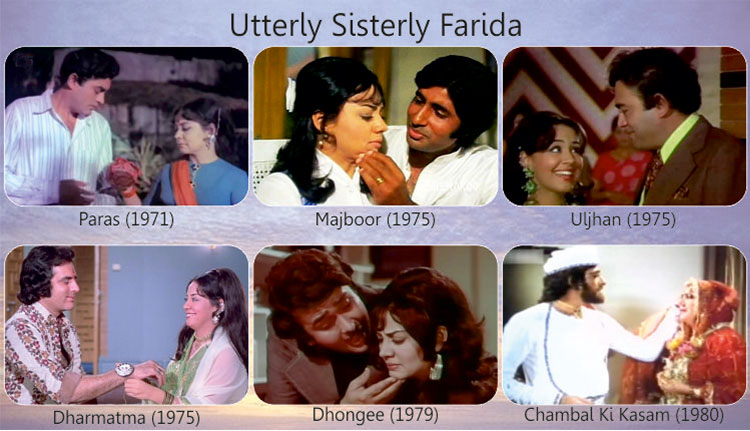
ACCOLADES AND AWARDS
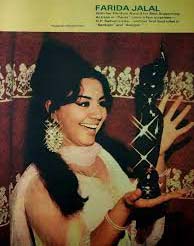 In the first ten years of her budding career, Farida Jalal won the Best Supporting Actress award of Filmfare twice: the first time for her sisterly supporting role in ‘Paras’ (1971) which was followed by Filmfare’s Special Jury Award for ‘Majboor’ (1975). Particular mention is made of the two stand out scenes from these two films.
In the first ten years of her budding career, Farida Jalal won the Best Supporting Actress award of Filmfare twice: the first time for her sisterly supporting role in ‘Paras’ (1971) which was followed by Filmfare’s Special Jury Award for ‘Majboor’ (1975). Particular mention is made of the two stand out scenes from these two films. 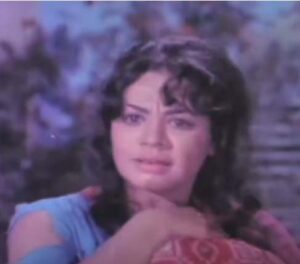 In ‘Paras‘, in the scene where her physical and psychological dignity is in danger, she portrays a plethora of emotions: angst, disgust, courage, fear, helplessness, hurt, pain and revenge. The conviction with which she articulated these emotions could cause even the silent spectators to harness a niggling feeling of guilt and remorse. Incidentally, after the success of ‘Paras’, in which she was teamed with Mehmood, she was offered several roles with him but she turned them down (as many as seven) as she didn’t want to get branded as a comedienne.
In ‘Paras‘, in the scene where her physical and psychological dignity is in danger, she portrays a plethora of emotions: angst, disgust, courage, fear, helplessness, hurt, pain and revenge. The conviction with which she articulated these emotions could cause even the silent spectators to harness a niggling feeling of guilt and remorse. Incidentally, after the success of ‘Paras’, in which she was teamed with Mehmood, she was offered several roles with him but she turned them down (as many as seven) as she didn’t want to get branded as a comedienne. 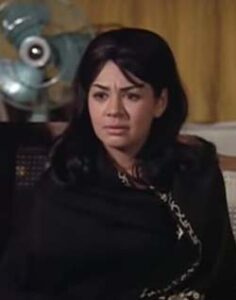 In sharp contrast, in ‘Majboor‘, in the scene where two policemen sit sentinel at her residence to keep vigil on the moves of her fugitive brother, she delineated simultaneously with her anxiety filled expressive eyes, the ambivalent emotions of the joy of seeing her brother peeping from the window and the helplessness of not being able to express the same, due to the intimidating presence of the policemen.
In sharp contrast, in ‘Majboor‘, in the scene where two policemen sit sentinel at her residence to keep vigil on the moves of her fugitive brother, she delineated simultaneously with her anxiety filled expressive eyes, the ambivalent emotions of the joy of seeing her brother peeping from the window and the helplessness of not being able to express the same, due to the intimidating presence of the policemen. Besides the nomination for ‘Aradhana’ and the above two awards, Farida Jalal was nominated two more times for her five minutes long role of an embittered and frustrated but self respecting Mrs Subramaniam in ‘Shaque’ (1976) and the jolly good, garrulous ‘paan’ chewing Laila in ‘Jurmana’ (1979). She felt that even getting a nomination for an award was as good as winning it which kept her in good stead.

The film industry’s fetish and fixation for type casting actors, especially the female actors, gives them little scope to break free from their stereotypes; the accolades and awards won by the actors only strengthen the justification of the filmmakers to type cast the actor. Once a sister, always a sister and Farida Jalal was no exception.
‘A’ GRADE FARIDA ~ ‘B’ GRADE FILMS
Side by side playing the secondary or sisterly roles, Farida Jalal did act as a lead heroine / second heroine in the first half of the 70s in a few B grade films with lesser known actors:
‘Puraskar’ (opposite Ramkumar)
‘Khoj’ (Deepak Kumar),
‘Lagan’ (Parikshit Sahni),
‘Pyar Ki Kahani’ (Anil Dhawan),
‘Aankh Micholi’ (Sharad Kumar),
‘Bees Saal Pehle’ (Ritesh Mukherji),
‘Jeevan Rekha’ (Tabrez whom she married eventually),
‘Sankalp’ (Sukhdev)
‘Dhoti Lota aur Chowpaty’ (Ramesh Arora).
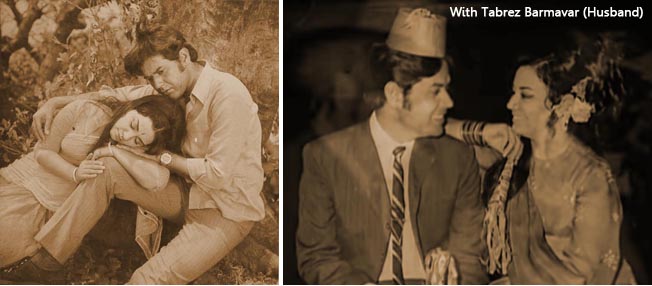
DIRECTOR’S DELIGHT
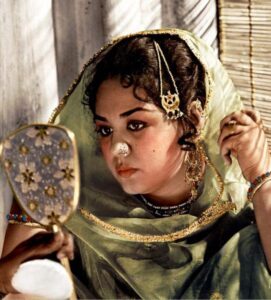 Irrespective of the length of her role, she breathed life in to her characters and made us take note of her jubilant presence and performances. The following films bear ample testimony to this: ‘Amar Prem’, ‘Bobby’, ‘Achanak’, ‘Heera’, ‘Kala Sona’, ‘Khushboo’, ‘Uljhan’, ‘Shaque’, ‘Koyi Jeeta Koyi Haara’, ‘Sabse Bada Rupaiya’, ‘Alaap’, ‘Charandas’, ‘Palkon Ki Chhaon Mein’, ‘Shatranj Ke Khiladi’ (she was among the chosen few who got to work with Satyajit Ray and in his only Hindi film) and ‘Jurmana’ (all released in the 70s).
Irrespective of the length of her role, she breathed life in to her characters and made us take note of her jubilant presence and performances. The following films bear ample testimony to this: ‘Amar Prem’, ‘Bobby’, ‘Achanak’, ‘Heera’, ‘Kala Sona’, ‘Khushboo’, ‘Uljhan’, ‘Shaque’, ‘Koyi Jeeta Koyi Haara’, ‘Sabse Bada Rupaiya’, ‘Alaap’, ‘Charandas’, ‘Palkon Ki Chhaon Mein’, ‘Shatranj Ke Khiladi’ (she was among the chosen few who got to work with Satyajit Ray and in his only Hindi film) and ‘Jurmana’ (all released in the 70s). 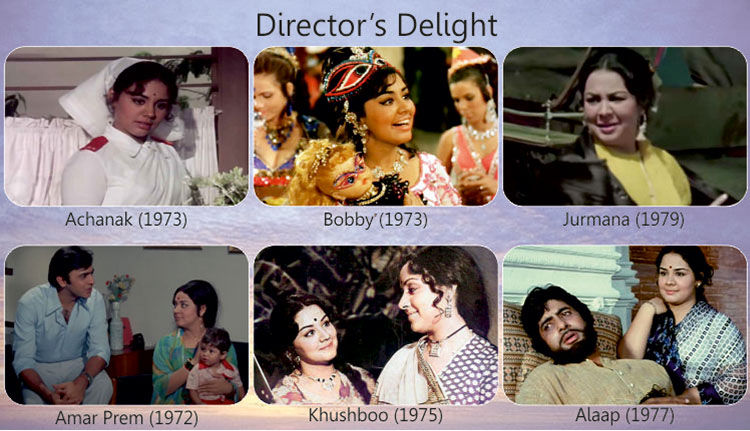
She is truly a director’s delight! Through her acting, suffused with a range of emotive prowess, she is a sure~fire alchemy. When she dons the mantle of a role, she is in a position to do justice, surpassing the expectations of the unit, enabling to create an ethereal experience with her power packed performance.
It is equally disheartening to find an actress of her caliber being underutilised or wasted in ill defined and inconsequential roles in films like: ‘Naya Raasta’, ‘Devi’, ‘Puraskar’, ‘Khoj’, ‘Buniyaad’, ‘Rivaaj’, ‘Zindagi Zindagi’, ‘Raja Rani’ (uncredited), ‘Asliyat’, ‘Naya Din Nayi Raat’, ‘Do Jasoos’, ‘Bundalbaaz’, ‘Lagaam’, ‘Abhi To Jee Len’, ‘Aakhri Goli’, ‘Kasam Khoon Ki’, ‘Ganga Ki Saugandh’, ‘Naya Daur’, ‘Chambal Ki Kasam’, ‘Pathhar Se Takkar’ (all of the 70s). Thankfully, both her roles and most of the films are beyond recall.
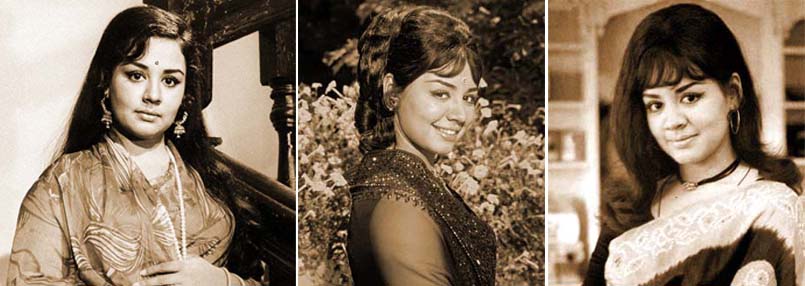
CAMPS ~ CLIQUES ~ COTERIES
Farida Jalal didn’t belong to any camp, clique or coterie nor did she bend over backwards to get ahead or to gain an end. Ergo, she wasn’t regular either in the feel good films of Gulzar and Hrishikesh Mukerji or commercial films of Raj Kapoor and Shakti Samanta with each of whom she had done a noteworthy film or two each. Equally baffling is she never worked with some of the mainstream bigwigs like B R Chopra, Manmohan Desai, Nasir Husain, Prakash Mehra, Raj Khosla, Ramesh Sippy, Subhash Ghai, Vijay Anand, Yash Chopra or the middle of the path filmmakers like Basu Chatterji and Shyam Benegal though she worked with Yash Chopra and Shyam Benegal in the second phase of her career.
PERFORMER PAR EXCELLENCE
Irrespective of the banner, the filmmaker, her costar, the length of her role, she breathed life in to every role that she did and left her ‘farid’ mark which helped her sustain for over five decades.
With her heart warming, sensitive portrayals, she tugged at our heart strings and made us sigh and sob but more often, with her effervescent presence and cheerful, lively and light hearted cameos, she kindled a smile, evoked a chuckle or invoked a loud laughter.

Farida Jalal was capable of much more but she never got those chances and challenges. It would be interesting to see the versatile actress play roles with grey shades cloaking her real personality. Sadly, in a male dominated industry, most female actors (barring a few lucky ones) are ordained to perform unquestioningly the stereotype subservient roles of a ‘behan’, bhabhi’, ‘bahu’ or ‘biwi’ and then graduate to playing the quintessential ‘maa’ and ‘daadimaa’.
In real life, Farida Jalal donned the role of an ideal ‘biwi’ when she got married to Tabrez Barmavar (her co star of ‘Jeevan Rekha’ and the out and out Muslim social ‘Aulea~e~Islam’) in November 1978 and a lovable ‘maa’ when a baby boy was born to the born actress in January 1983.
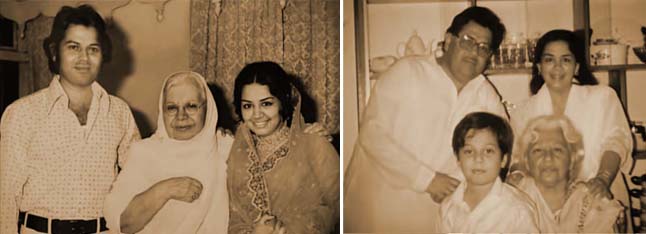
THE EIGHTIES
Farida Jalal had a few releases in the early 80s: ‘Abdullah’ and ‘Yaarana’ (in both the film’s, her miniscule roles were uncredited) and some inconsequental and forgotten films like ‘Pathhar De Takkar’, ‘Jwala Daku’, ‘Kanhaiya’, ‘Salam~e~Mohabbat’ and ‘Aan aur Shaan’.
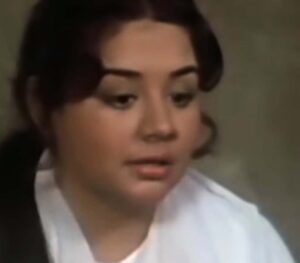 Incidentally, ‘Kanhaiya’ (1981), based on Charles Dickens’ ‘Oliver Twist’, was directed by her brother Khalid Sami. Farida Jalal played the role of an ailing and suffering widowed mother to child artiste Raju. Blending the reel with the real life, in the film she got to sing the song ‘Raj dulara, aankh ka taara, beta mera pyaara‘ and in the real life, two years hence, she gave birth to her ‘raj dulara, aankh ka taara‘ who was named Yaseen (meaning The heart of Qur’an).
Incidentally, ‘Kanhaiya’ (1981), based on Charles Dickens’ ‘Oliver Twist’, was directed by her brother Khalid Sami. Farida Jalal played the role of an ailing and suffering widowed mother to child artiste Raju. Blending the reel with the real life, in the film she got to sing the song ‘Raj dulara, aankh ka taara, beta mera pyaara‘ and in the real life, two years hence, she gave birth to her ‘raj dulara, aankh ka taara‘ who was named Yaseen (meaning The heart of Qur’an). SERENADING THE SMALL SCREEN
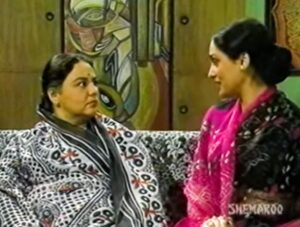 While fulfilling the duties of a wife and a mother, she dabbled with the small screen. She made her foray into television with the popular sitcom ‘Ye Jo Hai Zindagi’ (1984) which had a stellar cast: Satish Shah, Shafi Inamdar, Rakesh Bedi, Swaroop Sampat. She appeared more on the small screen in the second phase of her illustrious career. She acted in a few episodes and thereafter shifted base to Bangalore.
While fulfilling the duties of a wife and a mother, she dabbled with the small screen. She made her foray into television with the popular sitcom ‘Ye Jo Hai Zindagi’ (1984) which had a stellar cast: Satish Shah, Shafi Inamdar, Rakesh Bedi, Swaroop Sampat. She appeared more on the small screen in the second phase of her illustrious career. She acted in a few episodes and thereafter shifted base to Bangalore. Popular Songs Filmed on Farida Jalal
| Year | Film | Song |
| 1967 | Taqdeer | Jab jab bahar aayi |
| 1967 | Taqdeer | Aaiye bahar ko hum baantle |
| 1968 | Baharon Ki Manzil | Nigahen kyon bhatakti hain |
| 1969 | Mahal | Aaiye aap ka tha hamen intzaar |
| 1969 | Aradhana | Baghon mein bahar hai |
| 1971 | Lagan | Ik chhora hai, gora gora hai |
| 1971 | Paras | Jugni kehti hai baat pate ki |
| 1971 | Paras | Suno saathiyo, sachchai se badhke |
| 1971 | Pyar Ki Kahani | Ek khabar aayi suno |
| 1972 | Buniyad | Pukaaro mujhe tum pukaaro |
| 1972 | Bees Saal Pehle | Kehte hain saare hanste nazaare |
| 1975 | Kala Sona | Sunn sunn kasam se |
| 1976 | Sabse Bada Rupaiya | Dariya kinare ik banglo |
| 1977 | Palkon Ki Chhaon Mein | Allah megh de, paani de |
| 1979 | Chambal Ki Kasam | Chanda re, mere bhaiyya se kehna |
| 1981 | Kanhaiya | Raj dulara aankh ka taara |
Other musical mementos which bring evocative visages of Farida Jalal include evergreen songs like: ‘Ye phansa…’ (Bobby), ‘O shehri babu’ (Loafer), ‘Dekha phoolon ko kaanton pe sote hue’ (Majboor), ‘Tu kaahe roti hai’ (Dhongee) which revolve around her.
BYE BYE MUMBAI
Mumbai and movies ceased to fascinate the Barmawars. In 1984, Farida Jalal shifted base to Bangalore where her husband started a detergent business and she bid adieu to acting, arc lights and aamchi Mumbai. On one hand, his career was not picking up even after years of struggle and on the other hand, even she wasn’t getting worthwhile roles despite the two awards and three nominations in a short span of 15 years. It seemed like a decision taken as a mild protest. After all, the 70s was a decade marked by Amitabh and action, vendetta and violence and multi starrers leaving less scope for a consummate actor like her.
BANGALORE BLISS
While in Bangalore, Farida Jalal did a cameo in the Bangalore based film ‘Pushpak’ (1987) in which she played the wife of the magician character (Ramesh) and mother of Amala. Interestingly, after playing the roles of ‘behan’ ~ ‘bhabhi’ in several films of the 70s, for the first time, she played a mother of a lead actor. But was it also the last time as she had called it a day? Certainly NOT!
THE SECOND PHASE
To quote my favorite poet Dr. Allama Iqbal:
जहां में अह्ल~ए~ईमान, सूरत~ए~ख़ुर्शीद जीते हैं,
ईधर डूबे, उधर निकले; उधर डूबे, इधर निकले।
In this universe, men with faith and confidence live like the sun; they set here to rise there; they set there to rise here. Nothing can stop and suppress them in their journey. Farida Jalal too was unstoppable though she had put a voluntary end to her career after marriage. At times, some seeming endings ensue newer beginnings. A new chapter came to be written at that age and stage of her life when her name was getting relegated to the annals of history.
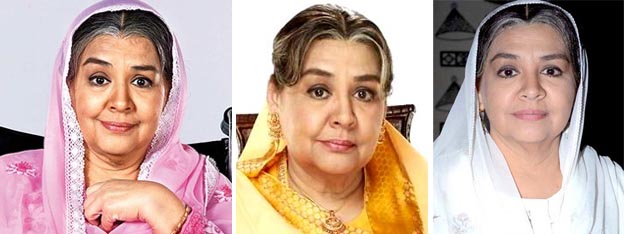
The second phase saw her playing the caring and compassionate, empathetic and sympathetic elderly characters, mostly the role of a mother or a grandmother of the lead actor or actress.
THE GRAND COMEBACK
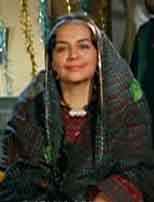 While still basking in the bliss of Bangalore, the lure of the Bombay film industry was too strong to resist especially when an offer comes from a thespian like Raj Kapoor (she had faced a similar predicament when she got the offer to play Dilip Kumar’s sister in ‘Gopi’). Soon after ‘Bobby’, Raj Kapoor had given her a promise to cast her in his film as and when a role demanded an actress of her caliber. And he kept his promise when he offered the coveted role of Bibi Gul in ‘Henna’ (1991).
While still basking in the bliss of Bangalore, the lure of the Bombay film industry was too strong to resist especially when an offer comes from a thespian like Raj Kapoor (she had faced a similar predicament when she got the offer to play Dilip Kumar’s sister in ‘Gopi’). Soon after ‘Bobby’, Raj Kapoor had given her a promise to cast her in his film as and when a role demanded an actress of her caliber. And he kept his promise when he offered the coveted role of Bibi Gul in ‘Henna’ (1991). Farida Jalal was back to films after a sabbatical of eight years. She made a grand comeback with Raj Kapoor’s cross border love story ‘Henna’ with a zanier zeal, zest and zing. She was aging gracefully. Yet, she was the same adorable, lively, lovable, sprightly, vivacious Geeta, Renu, Nandini, Bela, Nikki, Bindiya, Sulakshana, Chutki or Laila of the 70s.
HENNA: THE HARBINGER OF HOPE
‘Henna’ sent a strong message that humanity was above all and knows no barriers and boundaries, no faith and religion. Her role in the film was an extension of the role she did in the now forgotten film ‘Koyi Jeeta Koyi Haara’ (1976) in which she played a Muslim character who, in a quirk of circumstances, gives shelter to the hero (played by Shashi Kapoor) who is mistaken to be a spy.
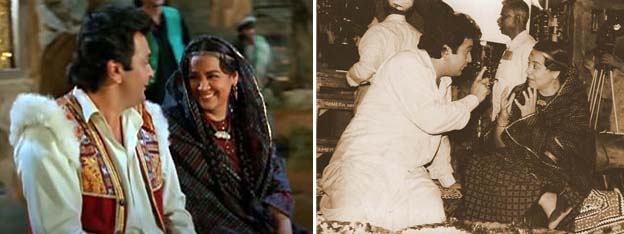
Her sensitive portrayal as a kind hearted ‘haqim’, a guardian angel, who cured ill minds and mindsets through human values of empathy, love and relationship irrespective of the geographical barriers, language and religion, fetched her again the Filmfare Best Supporting Actress award.
MAMMO~TH MOVIES
She repeated the feat when she won Filmfare’s Critics Award for the Best Actress for her punch packed portrayal of Mehmooda Begum aka Mammo in Shyam Benegal’s Muslim social ‘Mammo’ (1993) and for the role of Laajo in Yash Chopra’s mammoth romantic musical ‘Dilwale Dulhaniya Le Jaayenge’ (1995).
Like M S Sathyu’s ‘Garm Hawa’ (1974), ‘Mammo’ too portrays the plight of families divided by the partition, where political priorities defeat human bonds, emotions, interests and values. Farida Jalal played the resolute and strong willed Mammo all out to face and fight the system to get her visa extended.

In the modern Romeo and Juliet saga of Aditya Chopra, she played a doting mother and a dutiful wife tossed between the wishes of her daughter and whims of her domineering husband and their internal and external conscience struggles with a bold attempt to rebel and break free from traditions albeit in a fleeting scene.

All the three award winning roles in her second phase were as different and disparate from the other.
MOTHERLY ~ GRANDMOTHERLY
Farida Jalal was the quintessential mother or grandmother in a host of big banner blockbusters wherein she played her part with the ease of a veteran gliding effortlessly through a wide gamut of emotions; films like ‘Gardish’, ‘Laadla’, ‘Krantiveer’, ‘Dulara’, ‘Loafer’, ‘Raja Hindustani’, ‘Judaai’, ‘Ziddi’, ‘Dil To Pagal Hai’, ‘Salaakhen’, ‘Duplicate’, ‘Jab Pyar Kisise Hota Hai’, ‘Soldier’, ‘Kuch Kuch Hota Hai’, ‘Kaho Na Pyar Hai’, ‘Hey Ram’, ‘Dulhan Hum Le Jaayenge’, ‘Pukar’, ‘Kya Kehna’, ‘Bichhoo’, ‘Chori Chori Chupke Chupke’, ‘Lajja’, ‘Kabhi Khushi Kabhi Gham’, ‘Legend of Bhagat Singh’, ‘Badhai Ho Badhai’, ‘Deewangi’, ‘Pinjar’, ‘Jaal’, ‘Main Prem Ki Diwani Hoon’, ‘Garv’, ‘Tarzan: The Wonder Car’, ‘Student of the Year’. Quite an impressive repertoire!
Slide 04
SERENADING THE SMALL SCREEN
In the second phase of her career, Farida Jalal had an equally successful stint on the small screen with prestigious serials and sitcoms like the most popular ‘Dekh Bhai Dekh’, ‘The Great Marathas’, ‘Junoon’, ‘Shararat’, ‘Balika Vadhu’, ‘Ammaji Ki Galli’, ‘Satrangi Sasural’ to name a few.
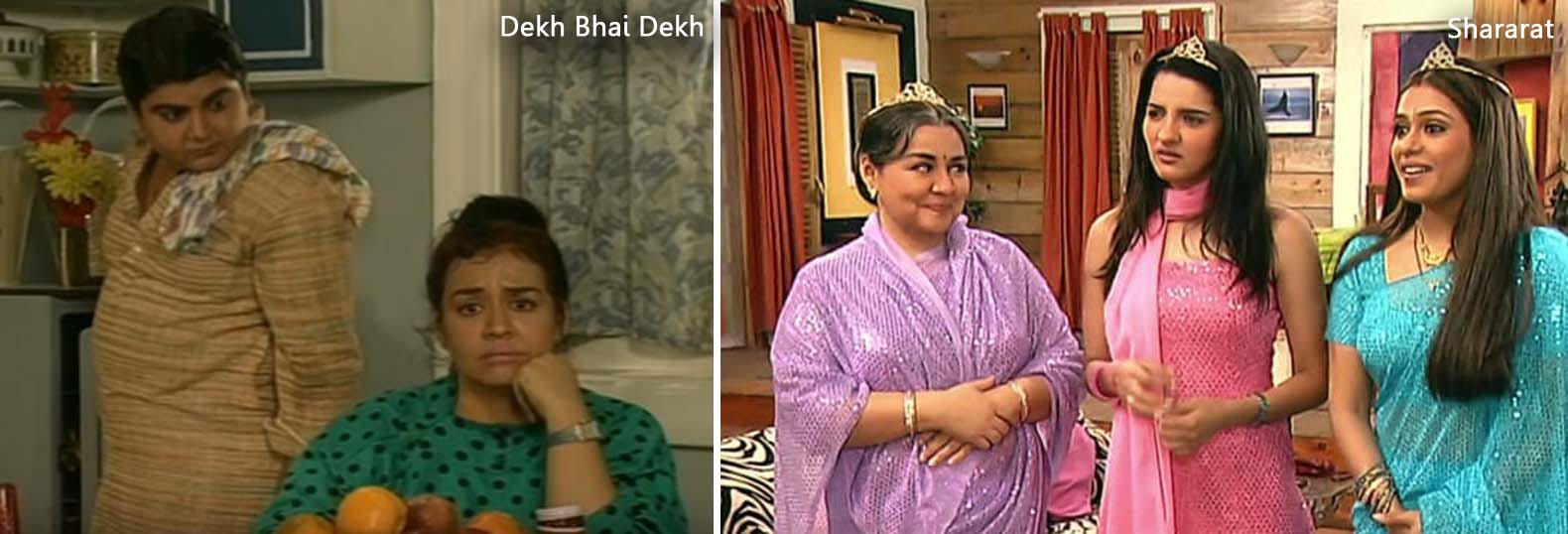
POST 2010
In the last ten years, Farida Jalal was seen fleetingly in few films like ‘Student of theYear’, ‘Batti Gul Meter Chalu’ and ‘Jawani Jaaneman’ and a poignant web series titled ‘Mehram’ which was about a certain law which made it mandatory for women haj pilgrims to be accompanied by a male blood relative.
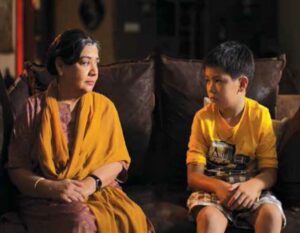 She also acted in an English drama film ‘The Gran Plan’ which won her the best actress award at the 20th Harlen International Film Festival in 2012 for her convincing portrayal of a lonely woman finding empathy with a ten year old boy despite age, cultural and language problem.
She also acted in an English drama film ‘The Gran Plan’ which won her the best actress award at the 20th Harlen International Film Festival in 2012 for her convincing portrayal of a lonely woman finding empathy with a ten year old boy despite age, cultural and language problem. As in a card game, you don’t leave the table, in the arclights of the tinsel town, there is no calling it quits. An actor is an actor and remains an actor and continues to act all his life.
As mentioned before, the first ‘bahar’ (spring symbolising a new beginning) that her divinely inspired ‘Taqdeer’ brought along with ‘Jab jab bahar aayi‘ and ‘Aaiye bahar ko hum baantle‘ pervades even today in the garden of her life. And, like the bounteous nature that resumes her loveliness with every spring, Farida Jalal too has been adding new life and new beauty to her artistic soul with every new film and performance.
DUA QUBOOL
After a long hiatus that includes the excruciating two years afflicted by the covid pandemic, Farida Jalal bounces back in action with a poignant and sensitive Muslim social titled ‘Dua Qubool’ made by yours truly!
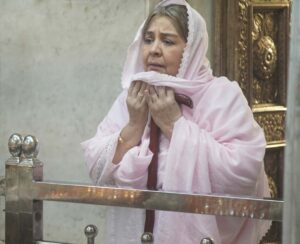 My undying passion and unabiding love for Hindi films and film music of yore and writing propelled me to diversify from being a film music events organiser to a full fledged film~preneur and make a ‘farid’ (distinct) film marked by a lyrical and poetic style of narration and presentation.
My undying passion and unabiding love for Hindi films and film music of yore and writing propelled me to diversify from being a film music events organiser to a full fledged film~preneur and make a ‘farid’ (distinct) film marked by a lyrical and poetic style of narration and presentation.I dabbled in a script in December 2018 and contemplated making a short film on a shoe string budget. It was more experimental than experiential. While the script was being written, the actor who came to mind to play the protagonist was, lo and behold, the legendary actor Farida Jalal! But it seemed as distant as a dream and as remote as a reality to rope in a celebrity star like her in a modest project of an inexperienced and complete novice filmmaker like me at the helm of it and calling the shots.
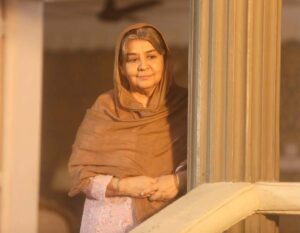 Several developments took place thereafter including a major health issue as well as the pandemic induced lockdowns which delayed initiating the operational dimensions of the project. Due to inevitable time lag, the project underwent a metamorphosis, expanded and had an inflated budget requirement, a grander dimension, extended proportion and enlarged magnitude. The title also changed from the pure and pristine ‘Dua’ to the positive sounding ‘Dua Qubool’.
Several developments took place thereafter including a major health issue as well as the pandemic induced lockdowns which delayed initiating the operational dimensions of the project. Due to inevitable time lag, the project underwent a metamorphosis, expanded and had an inflated budget requirement, a grander dimension, extended proportion and enlarged magnitude. The title also changed from the pure and pristine ‘Dua’ to the positive sounding ‘Dua Qubool’.With a positive attitude and mindset, I mustered up courage and met Faridaji in January 2021 at her unassuming and unpretentious spacious flat in Oshiwara with the offer to play the coveted role of Mahjabeen, a character that is emotionally and mentally strong, inspiring conviction and hope and a role that is potent and powerful in terms of substance and screen space. I was greeted with the typical effervescence and resplendence, glow and gaiety, friendly mien and manner and the trademark warm smile with which she lit up the screen for over 50 years.
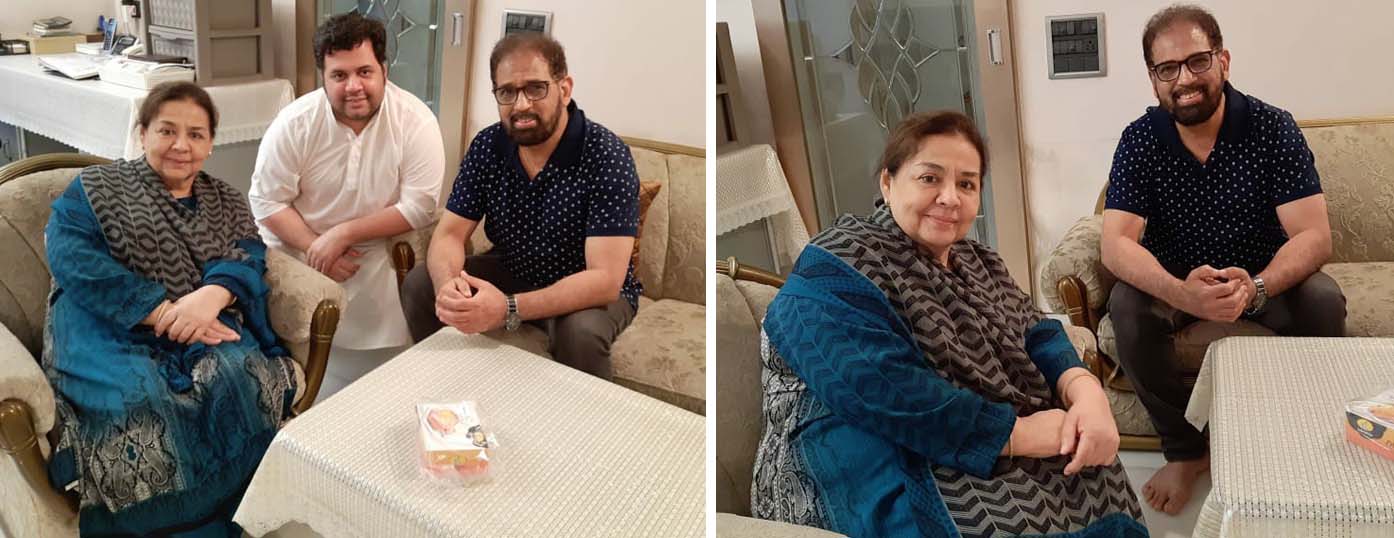
In the one hour and twenty minutes that I got to spend with her, inter alia, I gave her a brief overview of the story, the content and intent of the film, the tone, tenor and texture of her character and of the other characters with a child like enthusiasm and throbbing passion.
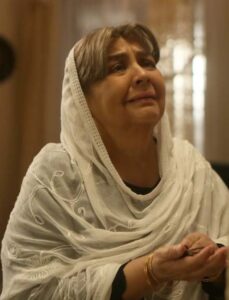 I left with a feeling of assurance, confidence, relief and self possession. A few more interfaces with the actor strengthened the confidence and infused faith in myself as a writer, actor and filmmaker.
I left with a feeling of assurance, confidence, relief and self possession. A few more interfaces with the actor strengthened the confidence and infused faith in myself as a writer, actor and filmmaker. By agreeing to don the mantle of Mahjabeen, true to her characteristic elan and elegance, Faridaji lifted up the morale of a debutant director’s dalliance with the silver screen in the tinsel town. I found my cherished dream transcending into reality and my ‘dua’ being answered. Indeed, a clear indication of ‘Dua Qubool’! Aum Amen Aamein!!!
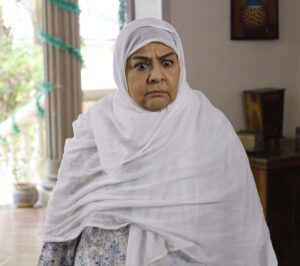 Faridaji plays the role of a disapprovingly doting and sternly sympathetic grandmother with an unwavering attachment and everlasting love for her errant and aberrant grandson Dua who has runaway from her home and heart. She is fiercely independent, financially secure with a portly kothi, altruistic, pious and, never the least, an epitome of hope. With her hands raised upward in ‘dua’, praying for the return of her grandson, the ‘qubooliyat’ quivers between hope and despair, happiness and despondence!
Faridaji plays the role of a disapprovingly doting and sternly sympathetic grandmother with an unwavering attachment and everlasting love for her errant and aberrant grandson Dua who has runaway from her home and heart. She is fiercely independent, financially secure with a portly kothi, altruistic, pious and, never the least, an epitome of hope. With her hands raised upward in ‘dua’, praying for the return of her grandson, the ‘qubooliyat’ quivers between hope and despair, happiness and despondence!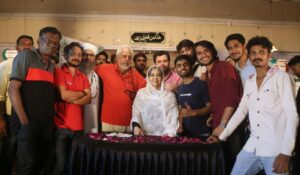 After several setbacks, hurdles and obstacles, the film finally went on floors in mid March 2022 and the shoot was wrapped up successfully by end March. Alhamdulillah! In each and every frame, Faridaji, as Mahjabeen, lit up the silver screen with a moonlight radiance adding gusto and gravitas to the character. Eensha Allah, ‘Dua Qubool’ is to bestow greater glory to the seasoned actor and decorate her with a lot more prestigious awards for her consummate performance displaying a plethora of emotions and expressions avalanching with such intensity that shackles the head and heart, mind and matter and senses and sensibilities!
After several setbacks, hurdles and obstacles, the film finally went on floors in mid March 2022 and the shoot was wrapped up successfully by end March. Alhamdulillah! In each and every frame, Faridaji, as Mahjabeen, lit up the silver screen with a moonlight radiance adding gusto and gravitas to the character. Eensha Allah, ‘Dua Qubool’ is to bestow greater glory to the seasoned actor and decorate her with a lot more prestigious awards for her consummate performance displaying a plethora of emotions and expressions avalanching with such intensity that shackles the head and heart, mind and matter and senses and sensibilities! It is unimaginable that a simple story which struck me by serendipity is now to be etched in the hallowed portals of celluloid. This would not have been possible without the efflorescent and illuminating presence of Faridaji lighting up the screen and making the actual difference.
 Faridaji, with my hands raised upward in ‘dua’ and deference, I wish you, on behalf of the ‘Dua Qubool’ team and on my own behalf, ‘Many Happy and Healthy Returns of Your Special Day ~ 18 May, 2022 and pray for many more years filled with bliss, contentment, energy, joy, happiness, peace and sunshine and, never the least, a good health and wellness’!
Faridaji, with my hands raised upward in ‘dua’ and deference, I wish you, on behalf of the ‘Dua Qubool’ team and on my own behalf, ‘Many Happy and Healthy Returns of Your Special Day ~ 18 May, 2022 and pray for many more years filled with bliss, contentment, energy, joy, happiness, peace and sunshine and, never the least, a good health and wellness’! फ़रीदा जी, यौम ~ ए ~ पैदाइश मुबारक़ हो!
अल्लाह रब~उल~इज़्ज़त से पुर ख़ुलूस दुआ है कि आप को जज़ा ~ ए ~ ख़ैर दे, आप को ख़ुश ~ ओ ~ ख़ुर्रम और अपने हिफ़्ज़ ~ ओ ~ अमान में रखे; आप को सेहत मंद रखे और उम्र ~ ए ~ दराज़ अता फ़रमाये; आप अपने हर मक़सद में बाक़माल और बेमिसाल अंदाज़ में कामयाब और कामरान हों.
दुआ क़ुबूल हो, दुआ क़ुबूल हो, दुआ क़ुबूल हो!
आमीन या रब~उल~आलमीन

Manohar’ Mohabbat’ Iyer

